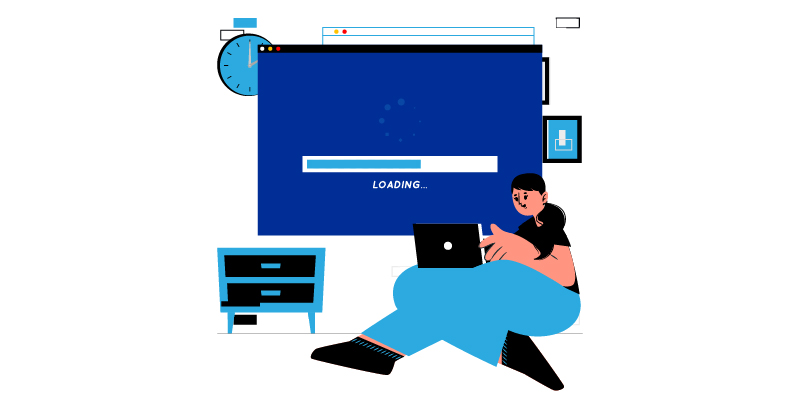
In the present-day digital era, ecommerce websites are necessary for companies to access broader audiences and boost sales.
However, building and preserving a prosperous ecommerce website arrives with its fair distribution of challenges. Ecommerce web developers play an essential role in surmounting these hindrances and guaranteeing the smooth operation of internet-based stores.
This blog from Creatix9 UK will focus on common challenges faced by ecommerce web developers and provide valuable insights on overcoming them. If you are searching to hire ecommerce web developers to manage these difficulties effectively, read on for necessary advice and considerations.
Performance and Load Times

Optimising efficiency and load times is crucial for runningDue to managing and handling excessive HTTP requests and large image files, developers face slow-loading pages. It can lead to dissatisfied customers, elevated bounce rates, and reduced conversion rates. To conquer this challenge, developers can use numerous techniques:
- Caching Techniques: Implementing caching mechanisms can considerably improve load times. Caching stores frequently entered data in temporary storage, decreasing the requirement to produce identical content repeatedly. Developers can use both server-side caching (using tools similar to Redis or Memcached) and client-side caching (leveraging browser caching).
- Optimising Images and Code: Large pictures and inadequately optimised code can cause sluggish load times. Developers should compress pictures without giving up quality, reduce CSS and JavaScript files to decrease size, and eliminate needless code or dependencies.
- Content Delivery Networks (CDNs): Developers can use CDNs that disperse website content on numerous servers in different locations. When a user enters the website, the content is provided from the closest server, decreasing latency and enhancing load times.
- Scalable Hosting Solutions: Ecommerce websites often encounter fluctuating traffic and are specifically designed to handle high volumes of visitors during peak periods such as sales and promotional events. When dealing with sudden increases in website traffic, it is recommended that developers choose hosting solutions that can quickly scale and adapt to changes in demand, such as Amazon Web Services (AWS), Microsoft Azure, and Google Cloud Platform. These options function similarly to cloud hosting and can quickly adjust resources.
Mobile Responsiveness

With a growing quantity of clients utilising mobile devices for internet-based shopping, offering an even user experience throughout different screen dimensions and devices is essential. To guarantee mobile responsiveness, developers can adhere to these practises:
- Mobile-First Approach: Instead of planning for desktop first, begin the design procedure with mobile devices in mind. This method ranks necessary content and capability for mobile individuals and then attracts the experience for more giant screens.
- Responsive Frameworks: Developers can utilise responsive web design frameworks (e.g., Bootstrap, Foundation) that automatically adapt the website arrangement and components established on the individual’s screen size.
- Testing on Different Devices: Developers can thoroughly experiment with the website on different devices, incorporating smartphones and tablets, to recognise and fix any responsiveness issues.
Security and Data Protection

Protecting delicate customer data is of tremendous significance for ecommerce websites. Security breaches can lead to severe penalties, comprising financial damage and hurt to the brand’s reputation. To manage security and data security challenges, developers an:
- SSL Certificates: Implement Secure Socket Layer (SSL) certificates to encrypt data transmitted between the individual’s browser and the web server. This guarantees secure conversation and constructs customer trust.
- Data Encryption: Store delicate data in encrypted formats, such as customer passwords and payment information. Use powerful encryption algorithms and adhere to optimal methods for encryption key management.
- Regular Software Updates: Keep all software, incorporating the content management system (CMS), plugins, and third-party libraries. Regularly updating these elements helps to patch known vulnerabilities and minimise the risk of security breaches and system instability.
- Security Audits: Conduct regular security inspections and penetration testing to proactively recognise and manage possible weaknesses.
Are you looking to fortify your online business against cyber dangers and data breaches? Partner with a reliable digital media agency for expert solutions.
Our team specialises in CMS website development and our online web development experts are proficient in creating secure and seamless ecommerce websites. Don’t compromise on security! Hire ecommerce web developers to safeguard delicate customer data and build customer trust. Contact us today!
Payment Gateway Integration
Integrating numerous payment gateways can be complex, as every gateway may have different APIs and requirements. To guarantee smooth payment processing, developers can:
- Research and Selection: Thoroughly investigate and choose trustworthy payment gateways that adjust with the website’s goal audiences and assisted regions. Consider elements similar to transaction fees, supported currencies, and security features.
- Proper Documentation: Follow the payment gateway company’s documentation cautiously to guarantee precise integration. Pay focus to API details and any particular instructions provided.
- Testing and Sandbox Environment: Before deploying the payment gateway on the live website, perform widespread testing in sandbox surroundings to confirm that payment management operations are flawless.
Inventory Management

Inventory management is essential for ecommerce websites with a wide variety of products. Sometimes it becomes challenging for developers to ensure real-time stock updates, manage product differences (e.g., sizes, colours), and handle arrangement satisfaction. They are necessary to supply a smooth buying experience. Here’s how developers can manage these challenges:
- Integration of Inventory Management Systems: Developers can incorporate the ecommerce framework with a sophisticated inventory management system. This incorporation allows real-time stock updates, guaranteeing that product accessibility is precise and up-to-date on the website.
- Automated Notifications for Low Stock Levels: Implement automatic notifications that warn the shop administrators when a product’s stock arrives at a particular threshold. This allows them to grab quick action, such as temporarily restocking or eliminating the product from the website.
- Product Variation Management: Ecommerce websites frequently provide items with numerous variations, such as different sizes, colours, or configurations. Developers should produce a user-friendly connection that allows clients to choose their wanted product differences and guarantees that the accurate inventory levels are updated accordingly.
- Synchronisation among Website and Inventory Database: Establish a trustworthy synchronisation mechanism to update inventory data among the ecommerce website and the inventory database. This synchronisation should occur in real-time or at regular intervals to preserve precise stock information.
Cross-Browser Compatibility
The primary difficulty in cross-browser suitability is that different web browsers explain HTML, CSS, and JavaScript code differently. This can guide to differences in how the website seems and operations throughout different browsers. Specific characteristics or designs may perform flawlessly on one browser but fracture on another, resulting in arrangement problems or operational discrepancies. This can result in an inadequate user experience and may even propel potential clients away.
Developers can conquer the difficulties of cross-browser suitability by embracing different strategies and optimal practises.
- Thorough Browser Testing: To guarantee regular performance, developers must perform widespread testing on numerous web browsers. They should try the website on well-liked browsers such as Google Chrome, Mozilla Firefox, Safari, Microsoft Edge, and others. Additionally, testing on elderly versions of these browsers can be precious to recognise suitability issues.
- CSS Vendor Prefixes: During the execution of new CSS features, developers should use seller prefixes to serve different browser requirements. By utilising prefixes similar to -webkit-, -Moz-, -ms-, or -o-, developers can ensure that the design operations are consistent throughout different browsers during the transitional stage before the characteristic turns into the standard.
- Follow Web Standards: Developers must follow the web standards established by organisations like the W3C to ensure that the code is written in a manner that web browsers can universally understand. Following established standards assists in relieving disclaimers and raises the probability of cross-browser compatibility.
- Graceful Degradation and Progressive Enhancement: Implementing graceful degradation allows the website to operate well on old browsers that may not support contemporary features. On the other hand, progressive enhancement means commencing with a fundamental version of the site and then including more sophisticated characteristics for browsers that can support them. This method guarantees that the website stays functional on various browsers.
Conclusion
Ecommerce web developers are instrumental in surmounting the difficulties in building and preserving prosperous internet-based stores.
By dealing with problems connected to performance, mobile responsiveness, security, payment gateways, inventory management, and Cross-Browser Compatibility, developers can produce a smooth buying experience for clients and assist companies in prospering in the very rival ecommerce landscape.
Staying up-to-date with the newest technologies and optimal methods is essential for developers to manage rising difficulties and bring outstanding ecommerce solutions.
So, are you thinking of giving your online store some boost? Work with a top digital media agency to make your website structure better. With the help of our team of professional online web development experts who specialise in CMS website development, you may overcome any challenges you have.
Hire ecommerce web developers as soon as possible so that they can deliver top-tier ecommerce solutions. Our expertise lets you remain current on the latest techniques and technologies in web creation. Contact us immediately to begin your journey to a successful and profitable internet business.

